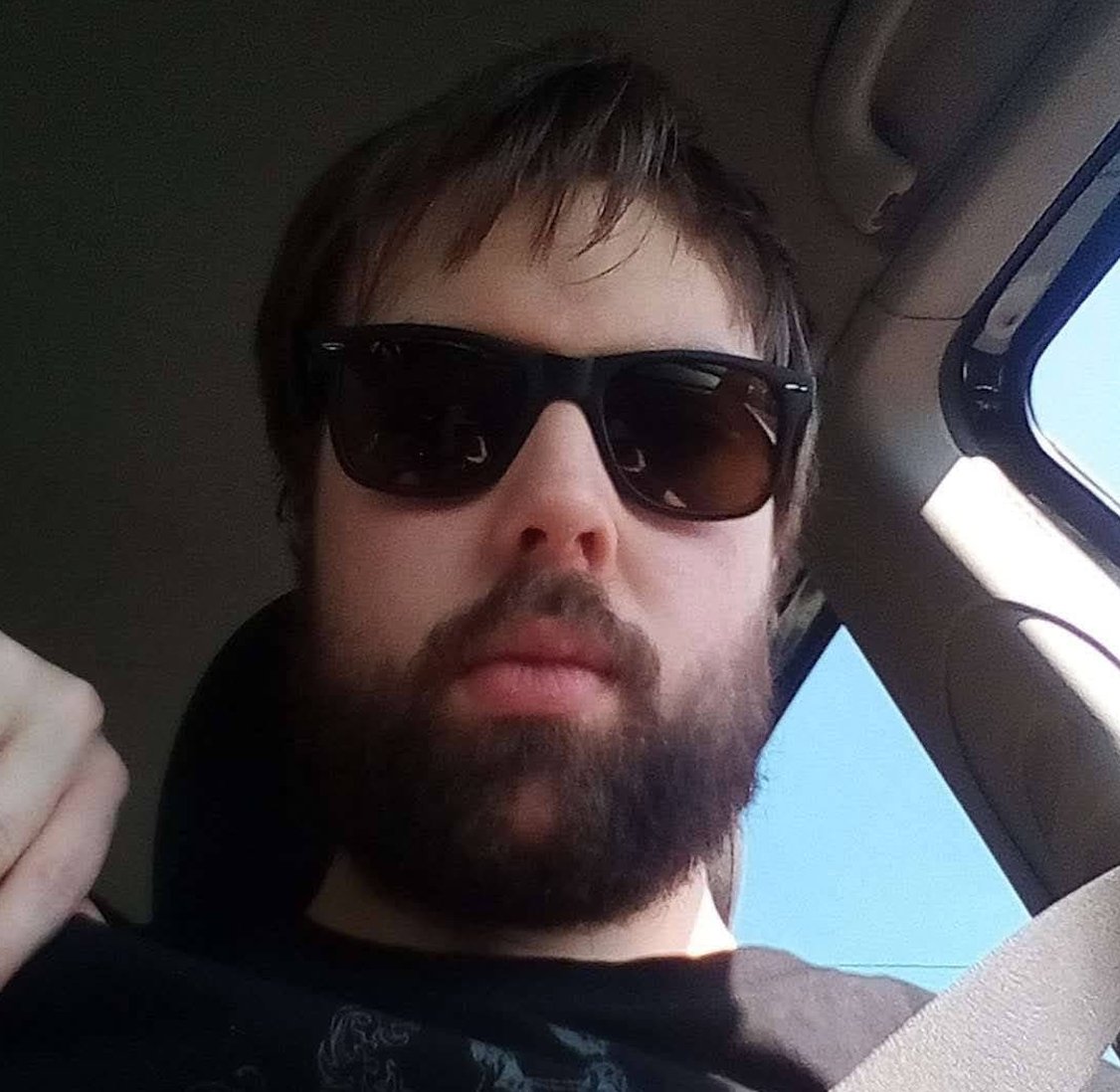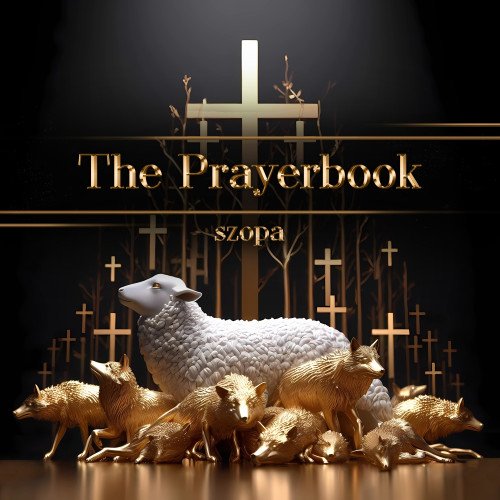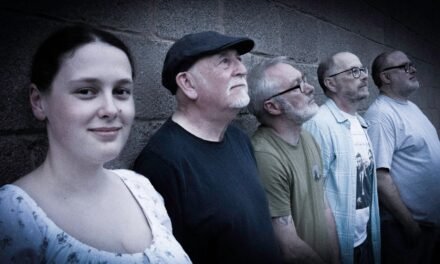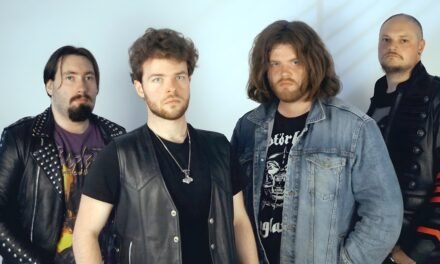Szopa Talks Latest Single, Songwriting And More


Words by Glenn Sargeant
Photo Credit: Supplied By Measure PR
Hailing from Poland and now based in Sheffield, Szopa is an audio-visual artist creating elegantly unique music – fusing elements of electronica, darkwave and gothic pop, his new album ‘The Prayerbook’ lands on Friday 16th August 2024. We were intrigued at JLTT and wanted to learn more:.
When did you begin songwriting?
It must’ve been around the age of 16, when I got my first piano – the first song I ever wrote, “Sun”, which opens my debut album, was composed around that time. I have very early memories of enjoying music and analysing music theory, but composing and songwriting does feel like something that came much later in my life.
What is your earliest musical memory?
My grandmother singing a Silesian folk song about a “black sheep”, I must’ve been only a few years old. There was a lot of music in my childhood, but nobody in my family played any instruments. Our Pentecostal neighbours all played guitars and instruments, and I used to go through my parent’s cassette collection quite a lot, but it was all Polish music – I vividly remember obsessing over Kasia Lesing’s “Wielki Błękit”. I’ve just put it on, actually, and I stand by my judgment from 25 years ago – absolute banger. My taste in music was much different as a kid/teenager than it is now – I used to listen to a lot of dance, trance, electronica and Polish/Balkan folk.
You have your new conceptual album ‘The Prayerbook’ released on Friday 16th August 2024. How did you want to approach the making of the album?
I am naturally drawn to electronica, loops, repetitive patterns – with the Prayerbook, I wanted to challenge myself a bit more and step outside of my comfort zones, explore writing bridges, harmonies, and try some new vocal tricks. I’m forever inspired by artists who create conceptual albums and implement clear visual themes in their music (Tori Amos, Bjork, iamamiwhoami), so it’s always been difficult for me to abandon that. I think it makes for a much more precise offering, something coherent and whole. There needs to be an objective and a clear outline of what I’m trying to say, and since I wrote the first 2-3 songs for the album, I knew I was doomed to have it all talk discuss religion and themes of devotion, so rather than trying to step away from it, I tried to push even further in that direction, exploring sounds associated with churches and Catholicism.
What is the story behind the album title?
Halfway through writing the album, I’ve realised that what I’m singing about isn’t necessarily that controversial – I was planning to call the album something edgy, you know, something like “Impiety” or “Blasphemy” (still upset about not utilising “impiety” – what a word!), but the more I wrote and the more I spoke to my friends about this theme, and religion in general, we realised it’s pretty pro-Christian. I showed the lyrics to “Holy Healer” to a close friend of mine and she pointed out that it’s pretty awesome that I’m criticising false idols and undermining religious authority. I think I accidentally did something that Jesus would heavily approve of. So I finished the album with songs that strengthened this message (white-out, Faith In You, Reverse My Prayer), and decided to entertain the thought of coming back to original christian values – the back of the vinyl shows 12 song titles carved into stone slabs, just like the commandments, with 12 being a very important number in christianity. Back in 90s Poland, we all had to memorize tiny little “prayer books” in public schools, and recite them in front of nuns and priests (crazy stuff, really). I’m not even sure what they were exactly – it was stuff like 10 commandments, but also selected bits of the bible. I thought it would be really fun to call my album exactly that, insinuating that these songs present a sort of moral message as well.
Where did you record the album and who produced it?
Everything was recorded in Sheffield – I do my own production and produce with my small home setup – I’ve got a few mics, synths, instruments, and weird things that make sounds – it’s enough for the most part, but not enough to take good vocal takes. I still work with Nort on that, he’s the producer responsible for my first album. His knowledge of vocal recording and general sound engineering is far superior to mine and I can’t get the quality his expertise brings into the mix – he’s brilliant, and he often has great ideas for harmonies.I also worked with some musician friends, Julien Goettelmann, who recorded guitars in Strasbourg, and Adrien D’Escalune, who recorded backing and lead vocals in Paris.
In addition, you have released the single ‘Where Do I Go’ which is out now. What was the story/inspiration behind that song?
It was one of the first songs I wrote for the album (Gloria, Holy Healer, Where Do I Go). The initial inspiration for the album came from months of thinking about my own beliefs, but also working through some trauma of growing up in a religious community – with “Where Do I Go”, I just thought that it would be neat to have a final song that touches upon the subject of an afterlife. I remember when the idea first came to me – it was much more elaborate and poetic, but sometimes complexity is a disadvantage when it comes to song lyrics, and I needed something that was simple and relatable. I used to be really scared of death. Not necessarily because I wouldn’t be “here” anymore, but because I would no longer be given the opportunity to be sentient. I find it crazy that from trillions of living things on the planet, past and present, their individual perception, their identity, is unique to all of them – I am me, and just me. There are so many sentient creatures on this planet, and we are only given this opportunity once. I found it entertaining to think that religion decided to fix this paradox with a thought of an afterlife. Being, possibly, the only animals with a deeper understanding of death and what it means, it’s just so complex and interesting. But as I said, it no longer bothers me as much – I try to gaslight myself with multiverse theories and believing in reincarnation. It does the trick.
Where is your hometown and could you please describe it in five words?
Świebodzin. Unwelcoming. Has a giant Jesus.
(for context, they have erected the biggest Jesus statue in the world there, it’s pretty random, but also, totally on the subject)
How do you look after your voice?
I’ve got a pretty strict regimen when I know I’ll be recording in the studio – I start 3-4 days prior and do loads of vocal exercises for pitch and range, I practice quarter tones as well. I don’t eat dairy or coffee before recording, it really “clogs” everything up. But I think that’s pretty much it.
You are given the opportunity to write the score for a film adaptation of a novel that you enjoy. Which novel is it and why?
Anything by Stanislaw Lem, especially Solaris or The Star Diaries. I don’t read as much as I used to as a kid, but I always loved Lem. I think that my music can be quite somber and unnerving, and I would love to create a more ambient soundtrack to a sci-fi film.
Who are some of your musical influences? Do you have any recommendations?
My music taste is very different from the music I make! I always get comments comparing my style to some obscure indie bands with male lead vocals, or someone asking me where my tribal and ethnic influences come from – I’m genuinely not sure, I once did a geo-natal astrology reading and it suggested I was Turkish in my past life, it’s the only explanation I have. I listen to a lot of alternative and indie stuff from the 90s, and it’s mostly female artists. I am a massive fan of Mylene Farmer, Tori Amos, Regina Spektor, Fiona Apple, Bjork, Pj Harvey, Diamanda Galas, Portishead, Lamb, but also a lot of Polish music – Pati Yang, Steczkowska, Nosowska. There’s loads. If I had to recommend something, it would be Baxter and their album of the same name from 1998 – Nino Ramsby’s vocals are just insane, and the production is mindblowing, it has aged very well. Another band worth mentioning is Pixx – their album “Small Mercies” is still on all of my playlists. It just doesn’t get boring at all.
Who created/designed the album artwork?
Myself! With some help from AI. We made the first album cover based on a photo-collage, second one based on photos taken during a music video shoot, and this one was a mix of digital art and AI. I studied graphic design and I’m always working on visuals around music releases, be it single covers, music videos or album designs. The vinyl release, in particular, has some great bits of design, including the inner sleeve having song lyrics laid out in a format resembling bible pages. The album is getting released alongside loads of merch and handmade trinkets, but there’s also one collab with Emma Allen (https://www.instagram.com/emmaburndesigns/), who created the design for the stickers.
Do you have any live dates planned in the UK/Europe in 2024/2025?
Unfortunately, no – however much I would love to perform live, I have a disability that makes it near impossible.
Was it a difficult album to write?
It was the easiest one to write so far – it felt very healthy to write about concepts that are a bit more detached from my personal life, I had a lot of fun experimenting with different vocal styles, new synths and recording techniques. Both the technical aspect of it and the creative process have been insanely satisfying. I used to fear that I might one day “run out” of songs or ideas, but they just kept coming – in fact, I have just checked, and I have written over 32 songs for this album, and narrowed it down to 12 of my favourites. They just kept coming. Can’t tell you how many times I had to jump out of the shower and rush to the piano because I had a new melody stuck in my head. It didn’t take a big emotional toll either, knowing that I’m not just processing life events or difficult feelings, but describing more abstract situations based on past experiences – it felt empowering to relive different memories of religious authority being abused and knowing it has no control over me.
What makes Szopa happy and what makes you unhappy?
I am a terribly simple person. I like cooking and cleaning. I like watering plants and taking care of animals. I am happy when I spend time with my friends, I am happy when I’m productive and working on something – be it a new album, a book, a poetry tome or something a bit more down to earth, like renovating my flat. I just need to have a project or two on the go at all times, something I can work on. I am rarely unhappy. I get upset with injustice, I have deep ideological problems with people being treated unfairly and can’t stand it, I can get very upset, and the current state of the world doesn’t help either. But I wouldn’t necessarily call that unhappy, to an extent it’s a very productive type of anger that pushes me to have more serious conversations with people in my surrounding, it pushes me to take action. I think I only ever get upset over small inconveniences, like a washing machine breaking. Other stuff, I can deal with.

Feature Image Photo Credit: Supplied By Measure PR
Szopa’s single ‘Where Do I Go’ featuring Cornish folk singer Kezia Warwood is out now.
Szopa’s new album ‘The Prayerbook’ is released on Friday 16th August 2024.
Pre-save the album here: https://snd.click/sqgi
Bandcamp: https://szopa.bandcamp.com/




